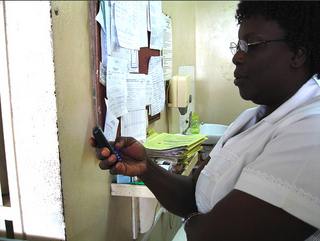
The World Health Organization Framework Convention on Tobacco Control is a treaty adopted by the 56th World Health Assembly held in Geneva, Switzerland on 21 May 2003. It became the first World Health Organization treaty adopted under article 19 of the WHO constitution. The treaty came into force on 27 February 2005. It had been signed by 168 countries and is legally binding in 182 ratifying countries. There are currently 14 United Nations member states that are non-parties to the treaty.
Interculturalism is a political movement that supports cross-cultural dialogue and challenging self-segregation tendencies within cultures. Interculturalism involves moving beyond mere passive acceptance of multiple cultures existing in a society and instead promotes dialogue and interaction between cultures. Interculturalism is often used to describe the set of relations between indigenous and western ideals, grounded in values of mutual respect.
Community health refers to simple health services that are delivered by laymen outside hospitals and clinics. Community health is also the subset of public health that is taught to and practiced by clinicians as part of their normal duties. Community health volunteers and community health workers work with primary care providers to facilitate entry into, exit from and utilization of the formal health system by community members.
Global Infectious Diseases and Epidemiology Online Network (GIDEON) is a web-based program for decision support and informatics in the fields of Infectious Diseases and Geographic Medicine. Due to the advancement of both disease research and digital media, print media can no longer follow the dynamics of outbreaks and epidemics as they emerge in "real time." As of 2005, more than 300 generic infectious diseases occur haphazardly in time and space and are challenged by over 250 drugs and vaccines. 1,500 species of pathogenic bacteria, viruses, parasites and fungi have been described. GIDEON works to combat this by creating a diagnosis through geographical indicators, a map of the status of the disease in history, a detailed list of potential vaccines and treatments, and finally listing all the potential species of the disease or outbreak such as bacterial classifications.

Global health is the health of the populations in the worldwide context; it has been defined as "the area of study, research, and practice that places a priority on improving health and achieving equity in health for all people worldwide". Problems that transcend national borders or have a global political and economic impact are often emphasized. Thus, global health is about worldwide health improvement, reduction of disparities, and protection against global threats that disregard national borders, including the most common causes of human death and years of life lost from a global perspective.
Multimorbidity, also known as multiple long-term conditions (MLTC), means living with two or more chronic illnesses. For example, a person could have diabetes, heart disease and depression at the same time. Multimorbidity can have a significant impact on people's health and wellbeing. It also poses a complex challenge to healthcare systems which are traditionally focused on individual diseases. Multiple long-term conditions can affect people of any age, but they are more common in older age, affecting more than half of people over 65 years old.

mHealth is an abbreviation for mobile health, a term used for the practice of medicine and public health supported by mobile devices. The term is most commonly used in reference to using mobile communication devices, such as mobile phones, tablet computers and personal digital assistants (PDAs), and wearable devices such as smart watches, for health services, information, and data collection. The mHealth field has emerged as a sub-segment of eHealth, the use of information and communication technology (ICT), such as computers, mobile phones, communications satellite, patient monitors, etc., for health services and information. mHealth applications include the use of mobile devices in collecting community and clinical health data, delivery/sharing of healthcare information for practitioners, researchers and patients, real-time monitoring of patient vital signs, the direct provision of care as well as training and collaboration of health workers.

Health in South Africa touches on various aspects of health including the infectious diseases, Nutrition, Mental Health and Maternal care.
Sexual and Reproductive Health Matters (SRHM), formerly Reproductive Health Matters (RHM), is an organisation that promotes sexual and reproductive health and rights (SRHR) globally. SRHM's mission is to advance the creation and dissemination of sexual and reproductive health knowledge that is grounded in human rights and based on credible evidence, and to facilitate the transformation of such knowledge into action for improved SRHR. This mission is shaped by the understanding that rights- and evidence-based knowledge is power.
Life expectancy in Nicaragua at birth was 72 years for men and 78 for women in 2016. While communicable diseases such as dengue, chikungunya, and Zika continue to persist as national health concerns, there is a rising public health threat of non-communicable diseases such as diabetes, cardiovascular disease, and cancer, which were diseases previously thought to be more relevant and problematic for more developed nations. Additionally, in the women's health sector, high rates of adolescent pregnancy and cervical cancer continue to persist as national concerns.

Francis Gervase Omaswa, MBChB, MMed, FRCS (Edin), FCS (ECSA), is a Ugandan cardiovascular surgeon, academic and administrator. He was installed as the chancellor of Soroti University, one of the nine public universities in Uganda at that time, in August 2022.
Lise Kingo is a Danish businesswoman who currently serves as Independent Board Director at Danone, Sanofi and Covestro. Kingo is also a member of the Advisory Board for Humanitarian and Development Aid at the Novo Nordisk Foundation.
Sarah Ssali, is a Ugandan social scientist, researcher, academic and academic administrator, who is an associate professor and dean of the School of Gender Studies at Makerere University, Uganda's oldest and largest public university.

Climate change in South Africa is leading to increased temperatures and rainfall variability. Evidence shows that extreme weather events are becoming more prominent due to climate change. This is a critical concern for South Africans as climate change will affect the overall status and wellbeing of the country, for example with regards to water resources. Just like many other parts of the world, climate research showed that the real challenge in South Africa was more related to environmental issues rather than developmental ones. The most severe effect will be targeting the water supply, which has huge effects on the agriculture sector. Speedy environmental changes are resulting in clear effects on the community and environmental level in different ways and aspects, starting with air quality, to temperature and weather patterns, reaching out to food security and disease burden.
The World Health Organization (WHO) created the Global Commission for the Certification of the Eradication of Poliomyelitis in 1995 to independently verify the eradication of wild poliovirus. The GCC certified the worldwide eradication of indigenous wild poliovirus type 2 on 20 September 2015, and wild poliovirus type 3 on 17 October 2019. In addition, five of the six World Health Organization Regions certified their status as free of indigenous transmission of all three serotypes of wild poliovirus :
The WHO model list of essential in vitro diagnostics, or WHO list of essential diagnostic tests (EDL) is a World Health Organization (WHO) priority list of medical tests that provides guidance for individual countries on which tests to use and which not to. It was first published in 2018, then revised in 2019, and a third edition was published in 2020.
Tuberculosis elimination is the effort to reduce the number of tuberculosis (TB) cases to less than one per 1 million population, contrasted with the effort to completely eradicate infection in humans worldwide. The goal of tuberculosis elimination is hampered by the lack of rapid testing, short and effective treatment courses, and completely effective vaccine. The WHO as well as the Stop TB Partnership aim for the full elimination of TB by 2050—requiring a 1000-fold reduction in tuberculosis incidence. As of 2017, tuberculosis has not been eliminated from any country.
The Developing Countries Vaccine Manufacturers Network (DCVMN) is a voluntary non-partisan public health alliance of health organizations and vaccine manufacturers. It has the goal of protecting people globally against known and emerging infectious diseases through the provision of a consistent supply of high quality vaccines at affordable prices for developing countries, to achieve vaccine equity. DCVMN includes manufacturers in Brazil, China, Cuba, India, Indonesia, Mexico, South Africa and other low and middle income countries (LMICs). It was established in 2000/2001, and is headquartered in Switzerland. As of 2021, the President is Sai D. Prasad, and the CEO is Rajinder Suri.
Prof David Guwatudde is a Ugandan academic and researcher. He is currently a professor of Epidemiology and Biostatistics in the Department of Epidemiology and Biostatistics at the School of Public Health, Makerere University College of Health Sciences.

The United Nations SDG Publishers Compact is a non-binding United Nations pact open to publishers, associations, booksellers and other organizations involved in the publishing industry, in support of the United Nations 17 Sustainable Development Goals (SDGs). The involvement of academic publishers reflects the importance of research and education as essential elements for making progress towards achieving the SDGs.







